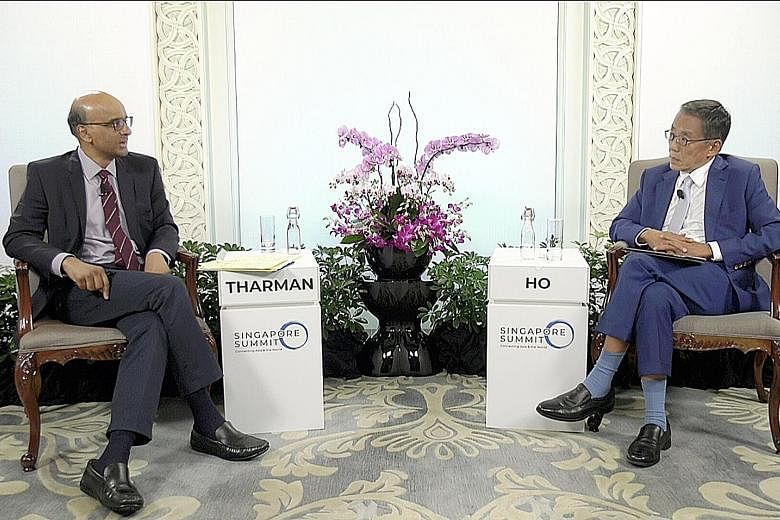Despite growing divisions in the world, Singapore has to stay open in order to maximise opportunities for its people, said Senior Minister Tharman Shanmugaratnam.
At the same time, it has to manage this openness and assure its citizens of a stake in society.
"We cannot sustain our openness if we do not provide enough opportunities for our own people - it's not socially or politically sustainable.
"The two things go together."
He added that Singapore cannot be a middling business centre, but a regional and global hub that is open to people as well as trade and investment.
Mr Tharman, who is also Coordinating Minister for Social Policies, was speaking at a dialogue at the Singapore Summit yesterday on the topic of Anticipating A New World.
The annual summit gathers business and thought leaders to discuss global trends, and is held virtually this year due to Covid-19. It is usually held around the same time as the Singapore Grand Prix, which has been cancelled this year.
In the session moderated by Banyan Tree Holdings executive chairman Ho Kwon Ping, Mr Tharman said there are a few ways in which the Republic can stay open and yet "develop Singaporeans to the most".
First, develop Singaporeans at every skill level - by deepening their skills, moving on to adjacent skills, or switching sectors altogether.
Second, incentivise firms to anchor themselves in Singapore, including their regional and global teams which have a mix of locals and foreigners.
Third, ensure fair hiring and promotion practices. The Government takes this even more seriously now due to the economic downturn and an era of slow growth, he said.
"We are going to lean against the firms that do not take that seriously and hold them accountable."
Fourth, ensure a diversity of nationalities among the foreigners who are here; and finally, control the overall number of foreigners so that the "broad middle" of Singapore society and the lower-income can enjoy opportunities and fair competition.
Stressing that the fundamental aim is to maximise opportunities for Singaporeans, Mr Tharman said this process is not an exact science and requires continuous work.
While larger tech firms are thriving amid accelerated digitalisation due to Covid-19, a significant proportion of small and medium-sized enterprises (SMEs) in many econo-mies risk experiencing a "wipeout" in the next few years, he said.
"SMEs are not just part of an economy; they are part of society. They employ people, they are part of what constitutes a local economy.
"I don't think we want to end up with a world, two years from now, where you have a more heavily concentrated industry, where the winners might be doing well in their own right, but there is a bleak landscape outside of them."
To avoid this in Singapore, he said, the Government has given fiscal support to firms during the crisis, as well as carried out industry upgrading strategies such as the industry transformation maps.
He added that while it is not sustainable for the Government to shore up firms with ever increasing funds, it will have to play a larger coordinating role so that the market economy can function well and society can stay cohesive.
He outlined three ways to do so: Work with industry, unions and educational institutions to ensure that those who lose their jobs can get new ones quickly; put in place digital platforms to help SMEs; and maintain trust in society and avoid divisiveness.
He added: "The role of the state - to keep the centre strong in society, to find every way in which contending parties can find some basis for consensus - that role, too, has grown."


